University of Oregon rowing team
The University of Oregon Rowing Team is located in Eugene, Oregon and practices at Dexter Reservoir nearby. The club was founded in 1967 and has operated continuously under the guidance of the University Club Sports Program.[1][2] At Oregon, men's and women's teams practice together and compete against other club teams regionally and nationally in a number of regattas each year. Even before the passage of Title IX in 1972, the Club received national attention for Coach Don Costello's controversial use of female coxswain Victoria Brown in crew, in a previously all-male sport.[3]
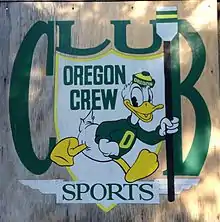
Since 2011, the team has raced annually at the end of May in the American Collegiate Rowing Association (ACRA) National Championship.[4]
The University of Oregon Boathouse is located next to the Oregon Association of Rowers (O.A.R.) at Dexter Reservoir. Each year, O.A.R. hosts the Covered Bridge Regatta which is the home regatta for both programs. In 2013, Dexter Lake was named one of the top racing venues in the United States by Row2k.[5]
History
1967–1972: The Founding Crew, Don McCarty, and Victoria Brown
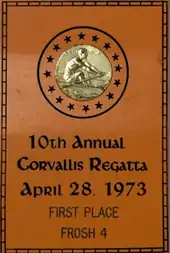
Efforts to build a rowing program at Oregon reappeared in 1967 under the direction of university administrators Don McCarty and Ken Abbey and a founding crew of twenty-two oarsmen.[6]
Oregon State Head Coach Karl Drlica loaned two rowing shells,[7] and McCarty rented a number of shells from Stanford coach Conn Findlay, at cost of $1500 per year.[8]
By 1969 the Oregon Rowers regularly competed in varsity races. The Register-Guard reported, "the University of Oregon had officially elevated crew to varsity status on a one-year provisional basis making it the 10th intercollegiate sport at the school."[9]
Initially an all men's group, because of Oregon's mixed status it was exempt from the new regulations of Title IX in 1972. Despite this, the Oregon Women's Crew was founded in 1973 and the team received significant national attention surrounding coxswain Victoria Brown, one of the first female coxswains to compete in men's collegiate rowing.[8] Traditionally, men's crews relied on male coxswains, and Brown's presence on the Oregon team stirred controversy.
1973–1980: Oregon's First Women's Crew
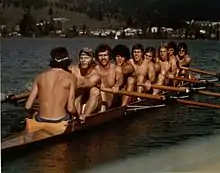
1973 marked an important year for the Ducks because it was then University-sponsored women's rowing.[8] Ralph Neils and Marti Abts had taken over for the men's and women's programs with Mike Napier and Bill Lioio as assistant coaches.
According to the Register-Guard, "The $350 spent on Oregon's first women's crew this year was apparently well spent. The U of O lightweights finished second to Washington in the recent Northwest championships in Seattle. And so did a heavyweight pair, Zanne Pratt and Debbie [Sprecher]."[8]
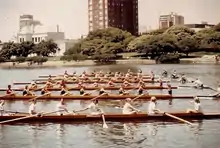
In the next season, Reed Adler took over as men's coach for the Ducks, and he was followed by Chuck Knoll in 1976.[10][11] Coach Brian Cole entered the 1968 Long Beach Rowing Trials, finishing two spots shy of an Olympic berth and earning a bronze medal.[12][13]
Between 1976 and 1980, the Oregon Women's Crew grew. Paul Schultz (Ithaca College '77) coached for two years, amazed at the strength, size and talent that showed up for rowing in the fall of '77. An over-six-foot Olympic-level skier whose career-ending injury on the slopes landed her at five and a woman reflecting her drive at six, there was a boat that won on Green Lake (tho- disqualified for a lane violation) and won in Corvallis. They were all novices, rowing against varsities and JVs, including were Carolyn McCloskey (rowed in high school) and Robin Riordan (rowed in the Pan-Am Games a few years later).
The Oregon Daily Emerald noted, "The University of Oregon varsity crew came up with two surges to hand Oregon State University a defeat... on Dexter Lake Saturday. With Lance Baughman at stroke and Russ Ward at coxswain, the Ducks held the Beaver eight, composed entirely of heavyweights (160 pounds and up) at bay over the remainder of the estimated 2,200-meter course, crossing the finish line in 7 minutes flat to 7:05 for OSU."[14]
The four-man lightweight and heavyweight boats overtook "all twelve of their competitors in the preliminary heats... to win the Championship in those events. For the first time in the crew team's history, they beat the Huskies in a varsity rowing event [!]" [15]
Leading up to the final race of the season against a dominant and undefeated UCLA boat, the crew earned the nickname Cinderella.[16]
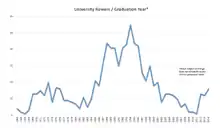
In an article titled, "It's an unlikely row to anywhere," the Register-Guard reported, "The key to the success of the four seems to be Hugh Watson, the 32-year-old Australian... 'I was rowing before Sietske (Folkens) was born,' said [stroke seat] Watson. [In addition, Sietske Folkens] rows No. 2. The No. 3 man is John Bigelow... the bow is Bryan Andressen... and the coxswain is Brenda Thornton." [17]
Hugh Watson sought out the help of graduate school dean and University vice-provost Dick Hersh. "Hersh... was an old-timer in the world of competitive rowing. After four years on the Syracuse crew, Hersh had been coxswain on the U.S. team at the 1966 world championships in Yugoslavia. He then coached at Harvard and coached two of seven Olympic rowing teams at Mexico City in 1968." When Watson approached him, Hersh was skeptical, "I think he thought that nobody in Oregon could be competitive on a national level. He came out for one row and was surprised at our standard. He's been out for every row since."[18] Hersh explained, "I told them that I felt I could make them six or seven seconds faster than they were, and that they needed to do 2,000 meters in six minutes, forty five seconds to beat UCLA. Well, they did six forty-six and won."[19]
"Oregon crew out-rows UCLA," The Register-Guard reported, "The University of Oregon crew team beat UCLA in a dual race Saturday to qualify for the National Sports Festival in Indianapolis, Ind., July 23–27", adding, "The Ducks completed the 2,000 meter course in 6:46.3. UCLA finished in 6:50.3".[20]
Hugh Watson said, "They were a lot bigger than us, and certainly more experienced. It was quite an upset. It is the most remarkable thing the Oregon crew has ever won."[21] The Ducks were just shy of a medal against "five larger teams from schools that offer rowing scholarships, and four teams from the national Olympic camp." [22]

The team's annual budget was $7,900.[23]
In a June 4, 1985 article The Register-Guard reported: "In the best finish ever for a University of Oregon crew team, the women's 'lightweight eight' team finished second Sunday in the Women's National Collegiate Rowing Championships. The Oregon unit, coached by Mike Holcomb, lost to Radcliffe, which covered the 1,750 meter course in 5:48.6. Oregon's team clocked 6:08.1... The Oregon crew was Robin Hendricks, Julie Martinson, Teresa Bujacich, Sasha Stone, Margie Bernards, Gayle Johnson, Cate Renfrew, Teresa Hukari and coxswain Lisa Woodworth." [24][25]
1986–1991: Jeff Moag and Marty Billingsley
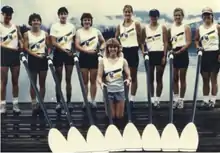
Sasha Stone join the coaching staff in 1988.[26]
Jeff Moag was the team's coach in 1990-1991. Coach Moag said Marty Billingsley's time was "comparable to the times of rowers in other categories, not only the best in the master's division but among the world's top times." He added, "It's probably a top 10 finish out of everybody in the world." She was Oregon's first World Champion (Indoor) Rower.[27]
1991–1996: Crews under Emerich, Borton, and Busse
Morgan Emrich coached from 1992–1993, Joe Borton coached from 1993–1994, and Phil Busse from 1994-1996.[28][29][30] Susan Belcher and James Mcqueen were assistant coaches in these years.[31]
The Oregon Daily Emerald reported in June 1993, "The men's lightweight team of the crew club will compete for the national championship June 11 and 12, in East Fork State Park in Cincinnati Ohio", and added, "Oregon defeated some of the top teams in the west, including California and Cal-Davis. Oregon must now face Ivy League powerhouses Harvard, Princeton and Dartmouth in the national competition."[32] Despite defeat at the 1993 national championship, the lightweight four had a near perfect season in 1994 winning every race except for their last.[33] The other strong boat in 1994 was the women's novice 8+. Their boat finished third out of sixteen competitors at the Northwest Regional Championship with a time of 7:19.5.[34]
The Oregon Daily Emerald wrote, "the Oregon men's and women's crew teams made a mockery of the competition on Saturday, taking home first place in all but one of their eight divisional races".[35]
The Oregon Daily Emerald also reported, "Aided by a stiff tail wind, the men's novice four team upset the No. 1-ranked Washington squad by a half second in the day's closest race. It was a crushing defeat for the Huskies who had been undefeated much of the year. Coach Phil Busse remarked, 'It was just a great day for the whole Oregon team, the men's novice four race was very exciting and worked out well for us.' "
1997–2001: Crews under Holmes, Gerlach, and Neron
In 1996-1997 two crews went to Opening Day Regatta at the University of Washington. The men's boat finished fourth of seven. The women's boat was disqualified after hitting a buoy and breaking a rigger. Holmes said, "I had no idea what to expect from that race, but they were winning at that point."[36][37]
The Oregon Daily Emerald reported in 1999 that the University was considering upgrading women's crew to intercollegiate status, in order to comply with Title IX. "Such a move has generated mixed feelings in team members and coaches, who say varsity status can be as much a curse as it is a blessing", and added, "Many women on the team now wouldn't make the cut on varsity."[38]
2002–2007: Athletic Department Overlooks Rowing
In the fall of 2002 Coach Chris Peters said he was attracted to the Oregon program because the University had, "potential to be a good rowing school. It has a lot of students, it's a large school and it's in the Pac-10." Peters left after one season.[39][40]
In February 2003 the Register-Guard reported on the potential for a varsity rowing program at Oregon, following an announcement by the University of Oregon that, "lacrosse will be the school's new women's varsity sport", which, "sent waves crashing through the hopes and dreams of some members of the local rowing community."[41]
Yasmin Farooq, a local volunteer coach for the O.A.R. master's program and a former NCAA Champion (1986), World Champion (1995), Olympian (1992, 1996) as a coxswain, said, "It's so mind-blowing to me that Oregon failed to see the potential right in front of them. You put a great coach on that lake, with the athletes that are available in this area alone, and within five years you could have a national champion." Adding, "When I moved out here (in 1996) and saw Dexter Lake, I had to pinch myself, I've raced on some of the best water in the world and I can tell you, Dexter is in the top five in the nation, and easily the best on the West Coast if you consider climate."[41]
According to Oregon associate athletic director Renee Mack Baumgartner, the senior women's administrator for the athletic department, many variables factored into the decision for women's lacrosse. Surveys of the team revealed "women's crew club team did not want to be separated from the men's crew team". Additionally, Baumgartner said, "Dexter Reservoir is 21½ miles from campus, while the lacrosse team will play on the field in front of the Casanova Center." Cost was also an issue: "Oregon figures show a $270,000 difference in yearly budget estimates ($530,000 for a fully funded lacrosse program, $800,000 for crew), and estimate a $4.17 million start-up cost that would include construction of a boat house at Dexter Reservoir and the purchase of boats."[41]
Baumgartner said, "Oregon wants to be competitive immediately. California, Stanford, Denver and Saint Mary's College are the only Division I women's lacrosse teams west of the Mississippi River... Crew, on the other hand, is already established at every Pac-10 school except Oregon, Arizona State and Arizona. [Adding] it would have taken a significant amount of time to be competitive." Baumgartner concluded, "I think in the future we will look back and say that we were proactive, we had the big picture and picked the right sport." Farooq responded, "They may win conference championships with lacrosse, but they would have won national championships with rowing."[41]
Despite these success the team began to decline. In 2006, The Emerald reported, "Duck rowers race at Dexter Lake", and "membership in the Crew Club has declined going into the busy spring season despite starting the year with a large roster".[42][43][44]
2008–2013: Carly Schmidt and ACRA
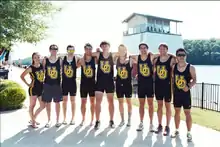
In the fall of 2008, Club Sports Director Sandy Vaughn discovered that the rowers had been practicing without a coach. The team found Carly Schmidt, who coached until the end of spring 2013. Under Schmdt, the program attended the American Collegiate Rowing Association (ACRA) National Championships for the first time in 2011. The 2011 team won two medals, a bronze in the women’s varsity 4+ and a silver in the men’s 1x.[45] In the following two seasons, Schmidt’s squads were able to place two more boats in the top 10 at the ACRA championships.
Three articles, titled, "All Aboard,"[46] "Rowers respond,"[47] and "Closer than They Appear,"[48] reported on the team over the 2010 season.
2014–2017: Kindorf Leads the Ducks
In the 2013-2014 season under Marlene Kindorf, the team made a number of equipment upgrades through $50,000 in fundraising and donation. That season, the team sent four boats to the ACRA national championships, including a women’s novice 8 that placed second in the event.[45] This was just the third medal the program had ever won at the ACRA championships, and the first in an 8+ event in any category.
Over the next four years as head coach, Kindorf’s boats would win four more medals, including the program’s first ACRA gold medal in the women’s novice 4 in 2016. In total, the team finished the four-year stretch with nine top-5 finishes at the ACRA national championships.[45] Prior to Kindorf’s tenure as head coach, the program had placed in the top 5 only twice.
After six years with the team as an assistant and head coach, and significant national success, Marlene Kindorf abruptly stepped down from her role following the 2017 season.
Oregon Rowing celebrated its 50th anniversary in September 2017.
2020: Pandemic Poses Challenges
The Covid-19 pandemic forced a cancellation of the fall 2020 season, and the team was forced to practice with just one rower in each boat.[49]
Former coaches
| Name | Year Associated |
|---|---|
| Don McCarty | 1967–1971 |
| Ken Abbey | 1967–1968 |
| Dave Thomsen | 1968–1969 |
| Don Costello | 1972–1973 |
| Ralph Neils | 1973–1974 |
| Marti Abts | 1973–1975 |
| Bill Lioio | 1973–1975 |
| Mike Napier | 1973–1974 |
| Reed Adler | 1974–1975 |
| Chuck Knoll | 1975–1976 |
| Brian Cole | 1975–1976 |
| Mike Johnson | 1976–1979 |
| Jim Medlock | 1976–1977 |
| Paul Schultz | 1977–1979 |
| Lori Huseth | 1981–1982 |
| Richard Hersch | 1982 |
| Jim Petrusich | 1982 |
| Mike Holcomb | 1982–1985 |
| Tim Meier | 1983–1984 |
| Andy Josa | 1985–1987, 2011–2015 |
| Dave Baugh | 1985–1988 |
| Sasha Stone | 1986–1988 |
| Jane LaRiveiere | 1989–1990 |
| Jeff Moag | 1988–1991 |
| Morgan Emrich | 1992–1993 |
| Joe Borton | 1993–1994 |
| James McQueen | 1994–1995 |
| Phil Busse | 1994–1996 |
| Phil Holmes | 1997–1999 |
| Scott Jones | 1998–1999 |
| Joe Neron | 1998–2002 |
| Craig Gerlach | 2001–2002 |
| Chris Peters | 2002–2003 |
| Laura Riekki | 2004 |
| Galen Mitterman | 2004–2007 |
| James Beasley | 2005–2007 |
| Brian Shimek | 2006–2007 |
| Erin Dury | 2007 |
| Marissa Mason | 2007 |
| Carly Schmidt | 2009–2013 |
| Molly Fales | 2009–2010 |
| Marlene Kindorf | 2011–2017 |
| Michael Johnson | 2012–2013 |
| Trevor Mathwick | 2013–2015 |
| Delaney Butler | 2014–2016 |
| Robert Maclean | 2015–2016 |
| Rachel Boehm | 2014 |
| Nathan Sandoval | 2016–2017 |
| Spencer Kales | 2016–2017 |
| Amanda Smith | 2016–2017 |
| Zachary Hedeen | 2017–Pres |
| Kathryn Budekke | 2017–2018 |
| Hali Meyer | 2017–2018 |
| Carlin Otterstedt | 2018-Pres |
Covered Bridge Regatta
The Oregon Association of Rowers (O.A.R.) began working to construct a boathouse at Dexter Lake in 1984 with the support of a $3000 US Rowing Grant. After nine years the boathouse was completed in 1993.[50] The group then organized and hosted its first Covered Bridge Regatta in 1995.[51]
The event traditionally takes place in the middle of April and offers three levels of competition: Masters, Collegiate, and Juniors. The event's namesake, the Lowell Covered Bridge, sits approximately 100 meters from the starting line of a 2,000 meter course running down to a finish line adjacent to the UO/OAR Boathouses. There is a dock which extends out along the course allowing for spectators at the 1,500 meter mark. In 2008 the OAR Masters completed the construction of a $70,000 buoyed course at Dexter.[52] In 2013, Dexter was named one of the ten best race courses in the country.[53]
In 2014, for its 20th anniversary, the event hosted, "Five hundred junior, collegiate and master rowers from 36 clubs competed in 44 events" over two days.[54] In 2015, the event is separating into two weekends: Collegiate Covered Bridge on April 11, and Covered Bridge Regatta (Masters/Juniors) on April 18–19.[55]
References
- Hoefflin, Walter (16 April 1967). "OSU Crew to Gain Major Sport Status". Eugene Register-Guard. Retrieved 4 September 2014.
- "Duck Crew Starts Well, Just Ask Oregon State". Eugene Register-Guard. 27 February 1968. Retrieved 4 September 2014.
- Editor, Joe Hansen, Outdoors. "Finding his rhythm". Coos Bay World. Retrieved 2018-06-19.CS1 maint: extra text: authors list (link)
- Hoyt, Joseph (November 3, 1014). "Q&A: Oregon Rowing Coach Marlene Kindorf Has the Ducks on the Rise". The Daily Emerald. Retrieved June 19, 2018.
- Hewitt, Ed. "Course Conditions: Roundup of Rowing Racecourses in the US in 2013". Row2k.com. Row2k. Retrieved 7 September 2014.
- Hoefflin, Walter (16 April 1967). "OSU Crew to Gain Major Sport Status". Eugene Register-Guard. Retrieved 4 September 2014.
- Hoefflin, Walter (16 April 1967). "OSU Crew to Gain Major Sport Status". Eugene Register-Guard. Retrieved 4 September 2014.
- Kayfes, Dave (10 June 1974). "The girls take to the water" (Page 1D). Eugene Register Guard. Retrieved 4 September 2014.
- "Oregon Adds Crew to List" (Page 4D). Eugene Register-Guard. 3 April 1969. Retrieved 4 September 2014.
- Hopfer, Ray (Spring 1975). "Oarsmen Falter". Oregon Daily Emerald. Retrieved 4 September 2014.
- "Knoll named UO crew coach". Oregon Daily Emerald. October 1975. Retrieved 4 September 2014.
- Boyovich, Vera (Spring 1976). "Starting from Scratch". University of Oregon Club Sports: Oregon Daily Emerald. p. 9A. Retrieved 4 September 2014.
- Hoefflin, Walter (13 June 1968). "Oarsmen Sets Sights on Olympics". Eugene Register-Guard. p. 1C. Retrieved 4 September 2014.
- "Oregon crew defeats Beavers". Oregon Daily Emerald. Spring 1977.
- Friedman, Steve (13 May 1982). "They have a few surprises". Oregon Daily Emerald.
- Malat, Randy (13 July 1982). "Cinerealla' crew strokes to the nationals". Oregon Daily Emerald. p. 1.
- Newnham, Blaine (11 July 1982). "It's an unlikely row to anywhere". Eugene Register-Guard. p. B1, B4. Retrieved 4 September 2014.
- Malat, Randy (13 July 1982). "Cinerealla' crew strokes to the nationals". Oregon Daily Emerald. p. 1.
- Newnham, Blaine (11 July 1982). "It's an unlikely row to anywhere". Eugene Register-Guard. p. B1, B4. Retrieved 4 September 2014.
- "Oregon crew out-rows UCLA". Eugene Register-Guard. 4 July 1982. p. 4F. Retrieved 4 September 2014.
- "Oregon crew out-rows UCLA". Eugene Register-Guard. 4 July 1982. p. 4F. Retrieved 4 September 2014.
- Levy, Doug (3 December 1982). "Crew: emerging from the dark". Oregon Daily Emerald.
- Levy, Doug (3 December 1982). "Crew: emerging from the dark". Oregon Daily Emerald.
- "Oregon crew second in nationals". Eugene Register-Guard. 4 June 1985. Retrieved 4 September 2014.
- Solemn, Karen, ed. (1997). American Rowers Almanac 1997. Ray Richard Solem. p. 246. ISBN 0965132714. OL 11733133M – via American Rowers Almanac, Inc.
- Field, Maile (1987). "Crew keeps competitive despite minimal finances". Oregon Daily Emerald. pp. 1, 9.
- Berg, Jake (Spring 1991). "Crew member rows to world title". Oregon Daily Emerald.
- "Sports". Oregon Daily Emerald. 3 June 1993. Retrieved 5 September 2014.
- McIver, Kelly (30 November 1993). "Row, row . . . row your boat". Eugene Register-Guard. p. 1D, 5D.
- Hood, Joel (Spring 1996). "Crew stays hot, ready for PCC". Oregon Daily Emerald.
- "UO Rowing Open Men Erg Test Nov. Results". Google Groups. 12 December 1994. Retrieved 6 September 2014.
- "Sports". Oregon Daily Emerald. 3 June 1993. Retrieved 5 September 2014.
- Elchenseher, Tasha (Spring 1994). "Crew grabs a pair of medals in Vancouver". Oregon Daily Emerald.
- Elchenseher, Tasha (Spring 1994). "Crew grabs a pair of medals in Vancouver". Oregon Daily Emerald.
- Hood, Joel (Spring 1995). "Oregon crew teams splash competition". Oregon Daily Emerald.
- "Crew crashes at regatta in Seattle". Oregon Daily Emerald. Spring 1997.
- "Crew has successful tune-up for Pac-10s". Oregon Daily Emerald. Spring 1997.
- Tryon, Davin (16 February 1999). "University may make women's crew a varsity sport". Oregon Daily Emerald. pp. 1, 8.
- Forrest, Jeremy (19 November 2002). "The early crew". Oregon Daily Emerald.
- Dittbenner, Richard (30 September 2003). "Chris Peters Joins San Diego State as new Assistant Coach". Row2k News. Retrieved 4 September 2014.
- Hansen, Chris (20 February 2003). "Reservoir of Reasons". Eugene Register-Guard. p. E1, E4.
- "Duck rowers race at Dexter Lake". Oregon Daily Emerald. 11 April 2006. Retrieved 4 September 2014.
- Pichette, Lenny (19 April 2007). "Regatta brings in teams from all over the Northwest". Oregon Daily Emerald. Retrieved 4 September 2014.
- "Crew". Oregon Daily Emerald. 15 May 2007. Retrieved 4 September 2014.
- "Regatta Results". americancollegiatrowing.com. Retrieved 27 May 2020.
- Hunter, Jack (10 March 2010). "All Aboard". Oregon Daily Emerald. Retrieved 4 September 2014.
- Simon, N. (13 April 2010). "Rowers respond". Oregon Daily Emerald. Retrieved 4 September 2014.
- Hunter, Jack (18 May 2010). "Closer than they appear". Oregon Daily Emerald. Retrieved 4 September 2014.
- Warner, Claire. "Club officers remain positive as organizations adapt to pandemic". Daily Emerald. Retrieved 2020-11-27.
- McIver, Kelly (30 November 1993). "Dexter rowers find a place to park". Eugene Register-Guard. p. 5D. Retrieved 4 September 2014.
- Hood, Joel (Spring 1995). "Oregon crew teams splash competition". Oregon Daily Emerald.
- Jude, Adam (13 March 2008). "Masters team, new race course gives OAR reason to smile". Eugene Register-Guard. Retrieved 4 September 2014.
- Hewitt, Ed (25 September 2013). "Course Conditions: Roundup of Rowing Racecourses in the US in 2013". Row2k. Retrieved 7 September 2014.
- Call, Pat (15 April 2014). "Rowers journey to Oregon with stiff competition for successful regatta". Vashon Beachcomber. Retrieved 6 September 2014.
- "CBR 2015". O.A.R. Retrieved 20 December 2014.